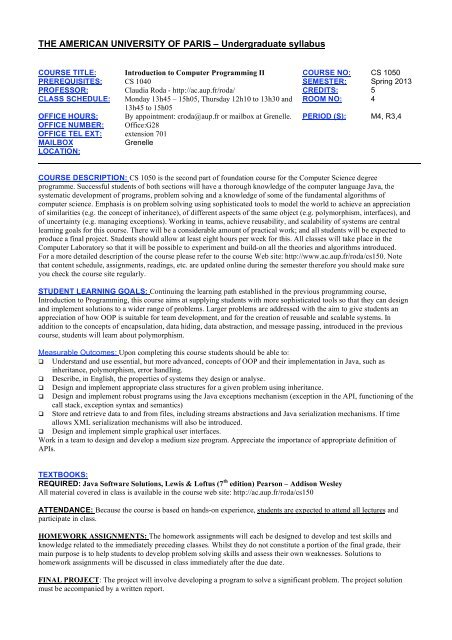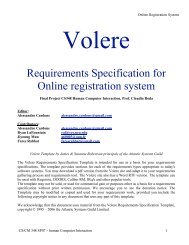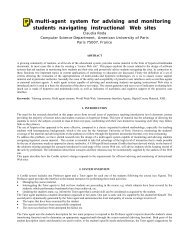Syllabus - Ac.aup.fr - The American University of Paris
Syllabus - Ac.aup.fr - The American University of Paris
Syllabus - Ac.aup.fr - The American University of Paris
You also want an ePaper? Increase the reach of your titles
YUMPU automatically turns print PDFs into web optimized ePapers that Google loves.
THE AMERICAN UNIVERSITY OF PARIS – Undergraduate syllabus<br />
COURSE TITLE: Introduction to Computer Programming II COURSE NO: CS 1050<br />
PREREQUISITES: CS 1040 SEMESTER: Spring 2013<br />
PROFESSOR: Claudia Roda - http://ac.<strong>aup</strong>.<strong>fr</strong>/roda/ CREDITS: 5<br />
CLASS SCHEDULE: Monday 13h45 – 15h05, Thursday 12h10 to 13h30 and ROOM NO: 4<br />
OFFICE HOURS:<br />
OFFICE NUMBER:<br />
OFFICE TEL EXT:<br />
MAILBOX<br />
LOCATION:<br />
13h45 to 15h05<br />
By appointment: croda@<strong>aup</strong>.<strong>fr</strong> or mailbox at Grenelle.<br />
Office:G28<br />
extension 701<br />
Grenelle<br />
PERIOD (S): M4, R3,4<br />
COURSE DESCRIPTION: CS 1050 is the second part <strong>of</strong> foundation course for the Computer Science degree<br />
programme. Successful students <strong>of</strong> both sections will have a thorough knowledge <strong>of</strong> the computer language Java, the<br />
systematic development <strong>of</strong> programs, problem solving and a knowledge <strong>of</strong> some <strong>of</strong> the fundamental algorithms <strong>of</strong><br />
computer science. Emphasis is on problem solving using sophisticated tools to model the world to achieve an appreciation<br />
<strong>of</strong> similarities (e,g. the concept <strong>of</strong> inheritance), <strong>of</strong> different aspects <strong>of</strong> the same object (e.g. polymorphism, interfaces), and<br />
<strong>of</strong> uncertainty (e.g. managing exceptions). Working in teams, achieve reusability, and scalability <strong>of</strong> systems are central<br />
learning goals for this course. <strong>The</strong>re will be a considerable amount <strong>of</strong> practical work; and all students will be expected to<br />
produce a final project. Students should allow at least eight hours per week for this. All classes will take place in the<br />
Computer Laboratory so that it will be possible to experiment and build-on all the theories and algorithms introduced.<br />
For a more detailed description <strong>of</strong> the course please refer to the course Web site: http://www.ac.<strong>aup</strong>.<strong>fr</strong>/roda/cs150. Note<br />
that content schedule, assignments, readings, etc. are updated online during the semester therefore you should make sure<br />
you check the course site regularly.<br />
STUDENT LEARNING GOALS: Continuing the learning path established in the previous programming course,<br />
Introduction to Programming, this course aims at supplying students with more sophisticated tools so that they can design<br />
and implement solutions to a wider range <strong>of</strong> problems. Larger problems are addressed with the aim to give students an<br />
appreciation <strong>of</strong> how OOP is suitable for team development, and for the creation <strong>of</strong> reusable and scalable systems. In<br />
addition to the concepts <strong>of</strong> encapsulation, data hiding, data abstraction, and message passing, introduced in the previous<br />
course, students will learn about polymorphism.<br />
Measurable Outcomes: Upon completing this course students should be able to:<br />
Understand and use essential, but more advanced, concepts <strong>of</strong> OOP and their implementation in Java, such as<br />
inheritance, polymorphism, error handling.<br />
Describe, in English, the properties <strong>of</strong> systems they design or analyse.<br />
Design and implement appropriate class structures for a given problem using inheritance.<br />
Design and implement robust programs using the Java exceptions mechanism (exception in the API, functioning <strong>of</strong> the<br />
call stack, exception syntax and semantics)<br />
Store and retrieve data to and <strong>fr</strong>om files, including streams abstractions and Java serialization mechanisms. If time<br />
allows XML serialization mechanisms will also be introduced.<br />
Design and implement simple graphical user interfaces.<br />
Work in a team to design and develop a medium size program. Appreciate the importance <strong>of</strong> appropriate definition <strong>of</strong><br />
APIs.<br />
TEXTBOOKS:<br />
REQUIRED: Java S<strong>of</strong>tware Solutions, Lewis & L<strong>of</strong>tus (7 th edition) Pearson – Addison Wesley<br />
All material covered in class is available in the course web site: http://ac.<strong>aup</strong>.<strong>fr</strong>/roda/cs150<br />
ATTENDANCE: Because the course is based on hands-on experience, students are expected to attend all lectures and<br />
participate in class.<br />
HOMEWORK ASSIGNMENTS: <strong>The</strong> homework assignments will each be designed to develop and test skills and<br />
knowledge related to the immediately preceding classes. Whilst they do not constitute a portion <strong>of</strong> the final grade, their<br />
main purpose is to help students to develop problem solving skills and assess their own weaknesses. Solutions to<br />
homework assignments will be discussed in class immediately after the due date.<br />
FINAL PROJECT: <strong>The</strong> project will involve developing a program to solve a significant problem. <strong>The</strong> project solution<br />
must be accompanied by a written report.
GRADING: <strong>The</strong> grading scheme is as follows:<br />
In class tests 45%<br />
Class participation 5%<br />
Final Examination and/or project 50%<br />
ATTENDANCE POLICY:<br />
Students studying at <strong>The</strong> <strong>American</strong> <strong>University</strong> <strong>of</strong> <strong>Paris</strong> are expected to attend ALL scheduled classes,<br />
and in case <strong>of</strong> absence, should contact their pr<strong>of</strong>essors to explain the situation. It is the student’s<br />
responsibility to be aware <strong>of</strong> any specific attendance policy that a faculty member might have set in the<br />
course syllabus. <strong>The</strong> French Department, for example, has its own attendance policy, and students<br />
are responsible for compliance. <strong>Ac</strong>ademic Affairs will excuse an absence for students’ participation in<br />
study trips related to their courses.<br />
Attendance at all exams is mandatory.<br />
IN ALL CASES OF MISSED COURSE MEETINGS, THE RESPONSIBILITY FOR COMMUNICATION WITH<br />
THE PROFESSOR, AND FOR ARRANGING TO MAKE UP MISSED WORK, RESTS SOLELY WITH THE<br />
STUDENT.<br />
Whether an absence is excused or not is ALWAYS up to the discretion <strong>of</strong> the pr<strong>of</strong>essor or the department.<br />
Unexcused absences can result in a low or failing participation grade. In the case <strong>of</strong> excessive absences, it is up<br />
to the pr<strong>of</strong>essor or the department to decide if the student will receive an “F” for the course. An instructor may<br />
recommend that a student withdraw, if absences have made it impossible to continue in the course at a<br />
satisfactory level.<br />
Students must be mindful <strong>of</strong> this policy when making their travel arrangements, and especially during the<br />
Drop/Add and Exam Periods.<br />
ENGLISH LANGUAGE PROFICIENCY STATEMENT: As an Anglophone university, <strong>The</strong> <strong>American</strong> <strong>University</strong> <strong>of</strong><br />
<strong>Paris</strong> is strongly committed to effective English language mastery at the undergraduate level. Most courses<br />
require scholarly research and formal written and oral presentations in English, and AUP students are expected<br />
to strive to achieve excellence in these domains as part <strong>of</strong> their course work. To that end, pr<strong>of</strong>essors include<br />
English pr<strong>of</strong>iciency among the criteria in student evaluation, <strong>of</strong>ten referring students to the university Writing Lab<br />
where they may obtain help on specific academic assignments. Pr<strong>of</strong>iciency in English is monitored at various<br />
points throughout the student's academic career, most notably during the admissions and advising processes,<br />
while the student is completing general education requirements, and during the accomplishment <strong>of</strong> degree<br />
program courses and senior theses.<br />
OUTLINE: see course web site: http://ac.<strong>aup</strong>.<strong>fr</strong>/roda/cs150




